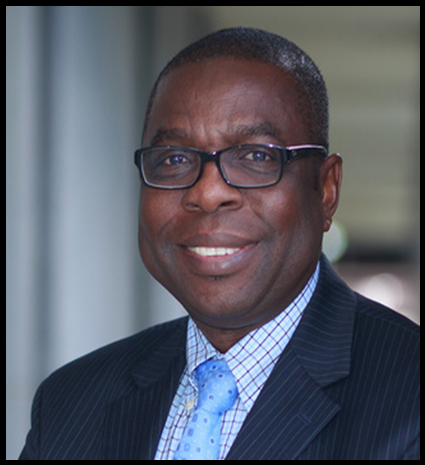Article Courtesy of University of Minnesota; view original published article here.
The Department of Family Medicine and Community Health (DFMCH) at the University of Minnesota (UMN) recently established an Endowed Chair for Health Equity Research. On May 5, 2016, Kola Okuyemi, MD, MPH was named as the inaugural recipient of this Endowment. In presenting the award on behalf of Macaran Baird, MD, MS (Professor and Head of DFMCH at UMN), Jim Pacala, MD, MS, (Associate Head of DFMCH) noted that “this honor comes with dedicated funds to support health equity research and associated community engagement and training.”

Kola Okuyemi, MD, MPH of University of Minnesota, Principal Investigator for NRMN’s Professional Development Core.
Okuyemi who is Professor of Family Medicine and Community Health, is the Director for the Program in Health Disparities Research (PHDR) and also the Director of Cancer Health Disparities for the Masonic Cancer Center, a National Cancer Institute designated Comprehensive Cancer Center. Founded in 2006, PHDR has grown to include 11 core faculty and over 40 affiliated faculty across the University of Minnesota campuses. Together, this group of faculty, with community and academic partners in the region and nationally, has brought in more than $65 million in research funding from the National Institutes of Health and national and local agencies and foundations such as the Robert Wood Johnson Foundation, Blue Cross Blue Shield of Minnesota, the American Lung Foundation and ClearWay Minnesota, among others.
In receiving the award, Okuyemi noted, “this honor is recognition of the collaborative work by my academic and community partners for their unwavering commitment to addressing health disparities”. Okuyemi further acknowledged support of “various community partners without whom our work has little meaning. You bring significance and purpose to our work. We study disparities, but you live with inequities every day.” Continuing, Okuyemi feels “inspired by this award to see that this work is recognized. I hope this will inspire my colleagues as well to continue the fight and uphill battle to ensure that everyone is given the opportunity to achieve the best possible state of health including physical, mental, social, and spiritual wellbeing”.
At the award ceremony, Susan Everson-Rose, PhD, MPH, Associate Professor of Medicine and Associate Director for PHDR noted, “PHDR leadership, faculty and staff share a deep commitment to authentic community engagement through not just research for academic purposes, but through the way we and the University of Minnesota conduct business and engage with historically underserved communities. It is by Kola’s leadership and example that we are able to do this work of promoting health equity that both drives us and sustains us. This approach is at the core of PHDR. Currently, PHDR has more than 50 community partners – these are people or organizations with whom the program has cultivated trusted reciprocal relationships and who, in the words of our Community Program Manager, Huda Ahmed, ‘can call us on a whim, and know they will be heard (and vice versa).”
Okuyemi has a passion for mentoring and developing the career of the next generation of health equity scholars. This is evidenced by his serving as one of the Principal Investigators for the National Research Mentoring Network (NRMN) funded through a $22 million grant from the National Institutes of Health. The NRMN is a nationwide consortium of biomedical professionals and institutions collaborating to provide all trainees across the biomedical, behavioral, clinical and social sciences with evidence-based mentorship and professional development programming.
About Program in Health Disparities Research: http://www.healthdisparities.umn.edu/about
About the Department of Family Medicine and Community Health: http://www.familymedicine.umn.edu/about